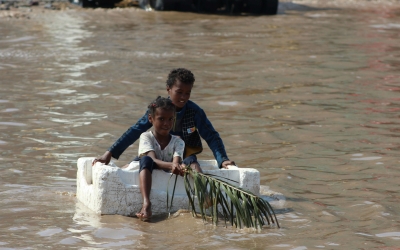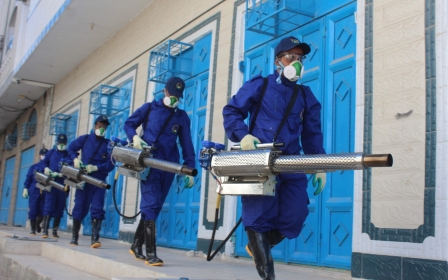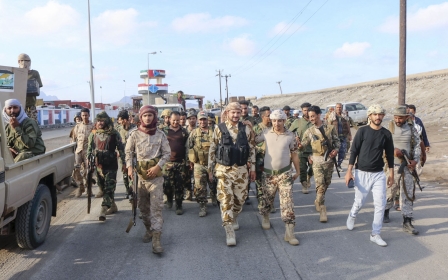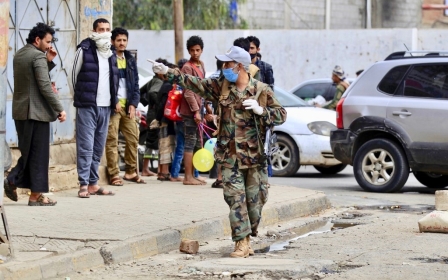Yemen's separatists take state revenues in Aden to tighten southern grip

After declaring self-rule across the south of the country, Yemen's Southern Transitional Council (STC) has moved to wrest control of its economy from the government, ordering all taxes and levies in Aden to be deposited in its bank accounts.
The bold move to redirect revenues from the government-controlled Central Bank in Aden is set to stoke tensions even higher, as fierce clashes between separatists and government forces erupted elsewhere in the south.
The secessionist group, which believes the south should be an independent state, seized Aden, the government’s provisional seat, after battles against forces loyal to President Abd Rabbu Mansour Hadi in August.
However, the council says it needs resources to manage Aden and its surrounding provinces.
On 25 April, the STC stepped away from a power-sharing deal with the government and declared it would take control of Aden's port and airport and other state institutions in the region, such as the central bank.
New MEE newsletter: Jerusalem Dispatch
Sign up to get the latest insights and analysis on Israel-Palestine, alongside Turkey Unpacked and other MEE newsletters
Earlier this month, Brigadier Ahmed Saeed Bin Braik, head of the STC, instructed all public and private institutions in Aden to deposit tax and customs revenues in the council’s accounts at Al-Ahli Bank, also know as the National Commercial Bank, in the port city.
Who is Yemen's Southern Transitional Council?
+ Show - HideFormation
Formed in 2017, the Southern Transitional Council is a secessionist movement focused on gaining independence for South Yemen. Comprising of 26 members, the STC includes five governors from Southern Yemen and two former government ministers.
The STC emerged after Hadi fired Aden governor Aidarus al-Zoubaidi for alleged disloyalty in April 2017.
Hadi accused Zoubaidi of prioritising the Southern Yemen independence movement over a united Yemen. Following Zoubaidi's sacking, mass rallies were held in Aden to protest Hadi's move.
The STC was subsequently created a month later, with Hadi describing the council as illegitimate.
Historical background
The call for independence has been a source of contention for over a century. South Yemen's origins can be traced back to 1874 when the British Empire created the Aden colony and Aden protectorate.
Following its independence from Britain, South Yemen was formed in 1967 and later became the People's Democratic Republic of Yemen in 1970, a Soviet Union-backed Marxist-Leninist state, the only one of its kind in the Middle East during the Cold War.
The Soviet Union's collapse led South Yemen to merge with the North to form a unified Yemen. That union, however, lasted only four years and led to the 1994 civil war, when South Yemen army units accused northern president Ali Abdullah Saleh's forces of corruption.
In 2007, the Southern Movement, also known as the al-Hirak al-Janoubi, was formed. Its stated aims were to demand equality under the law and a change in relations between north and south in the context of a united Yemen.
The Hirak was met with repression by Saleh's government. This set the foreground for the Southern independence movement to flourish during the Arab Spring after the Hirak began to champion Southern independence in 2009.
Backers
In 2016, the UAE helped create the SBF in southern Yemen. The SBF included many militants who supported a secessionist movement in Southern Yemen.
Forces within the SBF supported the STC, with the aim of establishing an independent South Yemen state. Since its formation, the SBF has played a crucial role in the Saudi-led coalition before the recent escalation.
Its successes came in part due to being militarily backed by the UAE. The backing included training of SBF fighters in Abu Dhabi and the supply of military equipment.
After receiving training, the SBF was dispatched to fight Houthi forces operating inside southern Yemen.
Emirati backing was crucial in helping the STC gain Aden, which has been under its control since 2018.
STC member and head of the economic committee, Abdul-Salam Humayd, said in a statement that Mualla port's customs, tax authority, ports authority, free zone customs, oil company and Aden’s refinery company have opened accounts at Al-Ahli Bank and placed their revenues in STC accounts.
He said other institutions are still working to open accounts in Al-Ahli, adding that the resources will be utilised in the interest of the south and the STC might stop paying salaries to public servants in northern provinces like Taiz.
The last battle
“The council is working under a clear plan aimed at recapturing our country. That’s why people in the south have been supporting the council,” an STC member told Middle East Eye on condition of anonymity because he is not authorised to speak to the media.
The source said the STC is gradually advancing towards its goal and after its forces took over Aden, and most of Lahj and Al-Dhale provinces, the time has come to seize control over the south’s financial resources.
He said the economic battle is decisive, as it can strengthen the STC and its management can therefore improve services in the south.
“We have reached the last battle and after the complete recapture of the revenues, the self-management will start reducing the suffering of southern people as money has been a major issue,” the source said.
“Our leadership found out that the Central Bank pays salaries for officials based outside Yemen in US dollars and that has pushed the currency towards collapse.”
Residents of Aden have been suffering from a number of diseases after the recent floods in the city in April and there are dozens of deaths on a daily basis, according to local reports.
Recent severe floods have left residents suffering from diseases such as malaria, dengue fever and chikungunya, which has led to dozens of deaths, according to local reports. The situation was further compounded by the outbreak of coronavirus in Yemen.
Late on Sunday, the Aden-based national coronavirus committee declared Aden an "infested city", due to the spread of coronavirus and other diseases.
The committee also announced 17 new Covid-19 cases, 10 of them in the southern port city, to raise the total count in areas under the government and STC control to 51, with eight deaths.
After years of war, Yemen’s collapsed healthcare system is unprepared to deal with a pandemic. Most of the hospitals in Aden have closed because of the virus. There is a notable lack of sanitation services in the city.
The situation pushed people to gather in the street on 9 May, but STC forces shut down the protest.
The STC source did not deny the move but accused the protesters of being supporters of Islah party – a Muslim Brotherhood party and a backbone of Hadi’s government.
“Why did we not see the protests last month or even earlier – in the last years? The residents’ suffering is not new in Aden, but the protesters wanted to create chaos in the city,” he said.
The source said once the STC seizes control over all of Aden’s resources, the secessionists will ameliorate the situation for the people, “as money has been a major issue”.
He added that it will put a plan in place to manage the resources.
Effectively, the STC is now in total control of Aden. After announcing the self-rule management of the south, pro-Hadi ministries in Aden started working under the council’s leadership.
Stronger player
A source in Yemen's information ministry told MEE that the STC has reached this step after “a green light” from its backer the United Arab Emirates, and the government cannot stand up to the Gulf power - a member of the Saudi-led coalition that intervened in Yemen’s war on behalf of the government.
“The STC violated all agreements and announced self-management of the south, and the coalition countries did not stop [STC head Aidarous] al-Zabidi and his militia.
'Every day the government becomes weaker since the UAE is supporting militias against it'
- Yemen information ministry source
“This means the UAE is happy with what the STC is doing and Saudi Arabia has stayed silent on this dangerous step.”
The sources said the only solution is for Yemenis to fight STC forces as he does not believe the coalition will help the government take back control of Aden.
“Every day the government becomes weaker since the UAE is supporting militias against it,” he said.
“President Hadi called on Saudi Arabia to intervene to help recapture Sanaa [from the Houthi rebels], but the kingdom has allowed the UAE to support militias to take the rest of Yemen.”
Pro-Hadi residents in Aden have been feeling pessimistic and some have even welcomed the unilateral move by the STC, seeing how the government did not help in reducing their hardship.
“It is true that some pro-government people in Aden welcomed STC’s self-management in Aden, as the government couldn’t do anything for them in recent years," said the government source.
“People usually support the stronger side, and the UAE has made the STC stronger than the government.”
On 8 May, Prime Minister Maeen Abdulmalik Saeed headed a cabinet meeting and accused the “STC militias” of leading a rebellion against government institutions in Aden.
That same day, the government directed the finance minister to close the council’s bank accounts in Al-Ahli in Aden and to investigate who allowed the bank to open accounts for the STC.
However, the government’s directives have not been carried out yet, and institutions are still depositing revenues in STC accounts.
While the STC and the government are both part of the coalition fighting the Houthi rebels, tension has been building between the nominal allies since Riyadh brokered a power-sharing deal in November, with both sides trading accusations of hindering the implementation of the agreement.
On Monday, pro-government forces advanced from Shabwa province to Abyan. Fierce battles have been reported in Abyan's Zinjibar district, 60km from Aden.
A better future
Saeed al-Wahidi, an accountant at a local business in Aden, said the company is going to deposit its taxes in Al-Ahli bank as its management believes the STC can serve Aden better than the government has.
'Ministers in Saudi hotels can’t help people under floods in Aden'
- Saeed al-Wahidi, accountant
“We have been witnessing diseases kill people in Aden and the government has not taken any action, so we should give the STC a chance to prove that they can improve services,” Wahidi told MEE.
The accountant said he is feeling hopeful that the coming months will be better in the city, as residents are “witnessing the worst period in Aden’s history”.
Wahidi also believes that since the government is based in Saudi Arabia, it doesn't know what the people of Aden are going through.
“We need a leadership that lives with us so it would share the suffering with us,” he said.
“Ministers in Saudi hotels can’t help people under floods in Aden."
Middle East Eye delivers independent and unrivalled coverage and analysis of the Middle East, North Africa and beyond. To learn more about republishing this content and the associated fees, please fill out this form. More about MEE can be found here.






